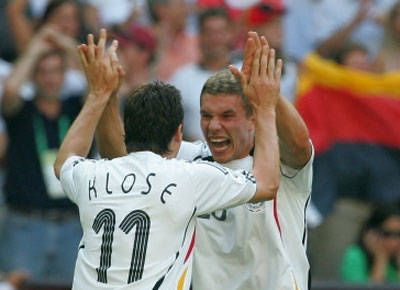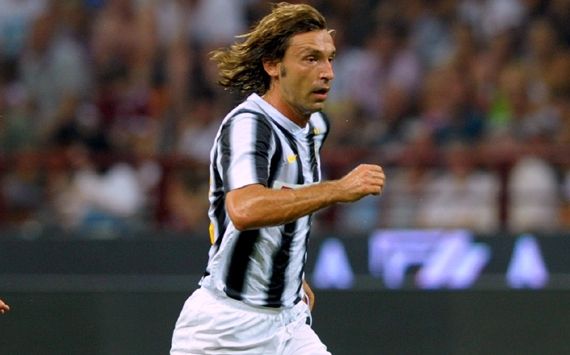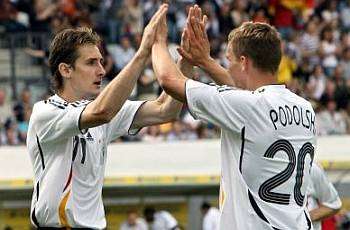COMMENT
By Clark Whitney | German football editor
A decade after he made his international debut, Miroslav Klose has become ingrained as a legend of German football. His 111 caps for the DFB team are second only to Lothar Matthaus; his 62 goals put him within striking distance of Gerd Muller’s record of 68.
Though never the most prolific striker at club level, Klose has always lifted his level of performance at international level. He was the top scorer at the 2006 World Cup, and his 14 goals over the 2002, ’06, and ’10 tournaments leave him just one strike behind Ronaldo’s record. It therefore comes with a bit of irony that Klose was born in Poland, and had been offered a call to the red-and-whites shortly before he earned his first cap for Germany under Rudi Voller.
The story of Lukas Podolski is quite similar to that of Klose: the Koln forward was born in Gliwice, Poland, and was interested in representing his homeland before then-national team coach Pawel Janas rejected him in 2003. He has since solidified his title as a “national team” player, like Klose – even though he scored just 15 Bundesliga goals in three years at Bayern Munich, Joachim Low never lost faith in the forward. And the coach’s faith has only been rewarded in full: despite often playing on the left flank, Podolski has scored eight goals in three major tournaments since 2006.
They have not managed to win a major title over the last decade, but Germany have finished in the top three in four of the last five major tournaments; their run is the most consistent of any national team, even if no campaign was punctuated with a trophy. But had it not been for Klose and Podolski, things would have been far worse for the DFB team.
A look at Germany’s run at Euro 2004 tells all: Voller inexplicably opted to use Kevin Kuranyi, and even the ageing Fredi Bobic, ahead of Klose, who played for just 34 minutes in total before Germany were knocked out in the group stage. Podolski was perhaps still too young to make an impact, but the decision to omit Klose, who had scored five goals in Korea and Japan two years prior, proved costly as Germany managed a paltry two goals in three games.
In 2006, a vastly improved Germany side hosted the World Cup, and finished third after being eliminated by eventual champions Italy. Injected with new faces in all areas, German doubled their Euro 2004 goals tally in their opener against Costa Rica, and went on to score 14 times at the tournament, with Klose and Podolski scoring five and three goals, respectively. Without their influence, Jurgen Klinsmann’s team could have easily been sent packing early.
Two years later, Germany were pre-tournament favourites to win Euro 2008. Klose struggled alongside strike partner Mario Gomez in the group stage, but Podolski picked up the slack and, in a very emotional match, delivered a crucial brace against Poland. In the knock-out rounds, Klose found his form, and scored pivotal goals in 3-2 wins over Portugal and Turkey. Germany had trouble in both matches, and without the Lazio man’s goals, may well have buckled under the pressure applied by their opponents late in each fixture.
But arguably the most influential tournament for Klose arrived in 2010. He scored one less goal than he had in the previous two World Cups, but his strikes came at absolutely critical times: most notably, he had the opener against England in the round of 16, and doubled Germany’s advantage over Argentina in the quarter-finals. Podolski, too, made his mark: his strike against Australia broke the ice for Germany at the tournament, and his finish to make it 2-0 against England was a turning point in that match.
Klose and Podolski have weathered some difficult times with Germany and, though there were often weak points elsewhere in the team, managed to help the DFB to consistent results that cannot be under-estimated. The results of previous tournaments speak of a job not yet complete, but can only provide a boost in morale: now more than ever, a trophy seems inevitable, be it in 2012 or 2014. As Klose recently stated, the current side is the strongest DFB team he's played for.
Germany face Poland on Tuesday in a friendly match that will help them become more acquainted with the grounds at Euro 2012. Of course, the accommodations in Gdansk will have some familiarity for two of their most prolific scorers, who no doubt will be moved by the occasion.
Follow Clark Whitney on
By Clark Whitney | German football editor
A decade after he made his international debut, Miroslav Klose has become ingrained as a legend of German football. His 111 caps for the DFB team are second only to Lothar Matthaus; his 62 goals put him within striking distance of Gerd Muller’s record of 68.
Though never the most prolific striker at club level, Klose has always lifted his level of performance at international level. He was the top scorer at the 2006 World Cup, and his 14 goals over the 2002, ’06, and ’10 tournaments leave him just one strike behind Ronaldo’s record. It therefore comes with a bit of irony that Klose was born in Poland, and had been offered a call to the red-and-whites shortly before he earned his first cap for Germany under Rudi Voller.
The story of Lukas Podolski is quite similar to that of Klose: the Koln forward was born in Gliwice, Poland, and was interested in representing his homeland before then-national team coach Pawel Janas rejected him in 2003. He has since solidified his title as a “national team” player, like Klose – even though he scored just 15 Bundesliga goals in three years at Bayern Munich, Joachim Low never lost faith in the forward. And the coach’s faith has only been rewarded in full: despite often playing on the left flank, Podolski has scored eight goals in three major tournaments since 2006.
| FROM POLAND WITH LOVE | Germany's eastern imports |
| Age of emigration | Int'l caps | Int'l goals | |
| Miroslav Klose | 8 | 111 | 62 |
| Lukas Podolski | 2 | 91 | 43 |
| Piotr Trochowski | 5 | 35 | 2 |
They have not managed to win a major title over the last decade, but Germany have finished in the top three in four of the last five major tournaments; their run is the most consistent of any national team, even if no campaign was punctuated with a trophy. But had it not been for Klose and Podolski, things would have been far worse for the DFB team.
A look at Germany’s run at Euro 2004 tells all: Voller inexplicably opted to use Kevin Kuranyi, and even the ageing Fredi Bobic, ahead of Klose, who played for just 34 minutes in total before Germany were knocked out in the group stage. Podolski was perhaps still too young to make an impact, but the decision to omit Klose, who had scored five goals in Korea and Japan two years prior, proved costly as Germany managed a paltry two goals in three games.
| GERMANY TOP SCORERS | ||
 | ||
| Name Gerd Muller Miroslav Klose Jurgen Klinsmann Rudi Voller Karl-Heinz Rummenigge Uwe Seeler Lukas Podolski | Goals 68 62 47 47 45 43 43 | Caps 62 111 108 90 95 72 91 |
Two years later, Germany were pre-tournament favourites to win Euro 2008. Klose struggled alongside strike partner Mario Gomez in the group stage, but Podolski picked up the slack and, in a very emotional match, delivered a crucial brace against Poland. In the knock-out rounds, Klose found his form, and scored pivotal goals in 3-2 wins over Portugal and Turkey. Germany had trouble in both matches, and without the Lazio man’s goals, may well have buckled under the pressure applied by their opponents late in each fixture.
But arguably the most influential tournament for Klose arrived in 2010. He scored one less goal than he had in the previous two World Cups, but his strikes came at absolutely critical times: most notably, he had the opener against England in the round of 16, and doubled Germany’s advantage over Argentina in the quarter-finals. Podolski, too, made his mark: his strike against Australia broke the ice for Germany at the tournament, and his finish to make it 2-0 against England was a turning point in that match.
Klose and Podolski have weathered some difficult times with Germany and, though there were often weak points elsewhere in the team, managed to help the DFB to consistent results that cannot be under-estimated. The results of previous tournaments speak of a job not yet complete, but can only provide a boost in morale: now more than ever, a trophy seems inevitable, be it in 2012 or 2014. As Klose recently stated, the current side is the strongest DFB team he's played for.
Germany face Poland on Tuesday in a friendly match that will help them become more acquainted with the grounds at Euro 2012. Of course, the accommodations in Gdansk will have some familiarity for two of their most prolific scorers, who no doubt will be moved by the occasion.
 | ||||
| PLAYERS IN | ||||
| Name | From | €m | ||
| Michele Pazienza | Napoli | Free | ||
| Mirko Vucinic | Roma | 15 | ||
| Stephan Lichsteiner | Lazio | 10 | ||
| Arturo Vidal | Leverkusen | 10 | ||

